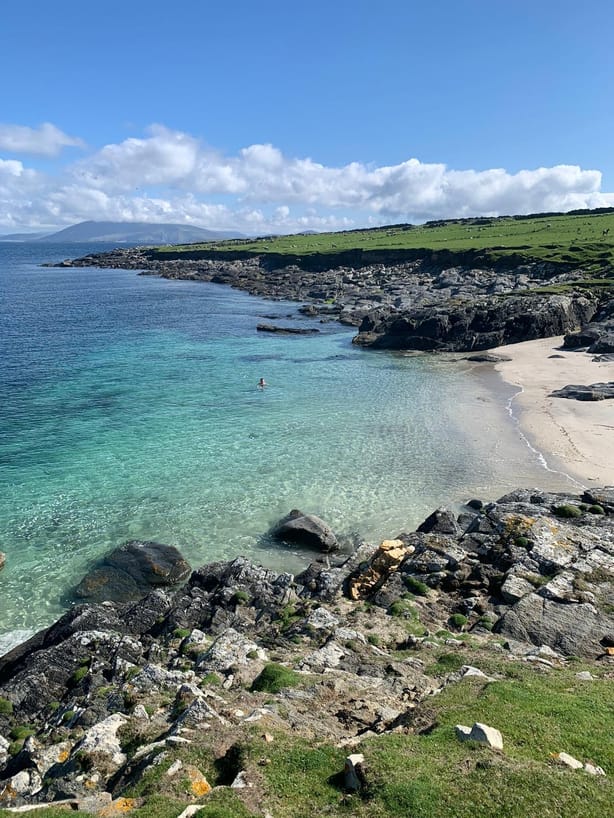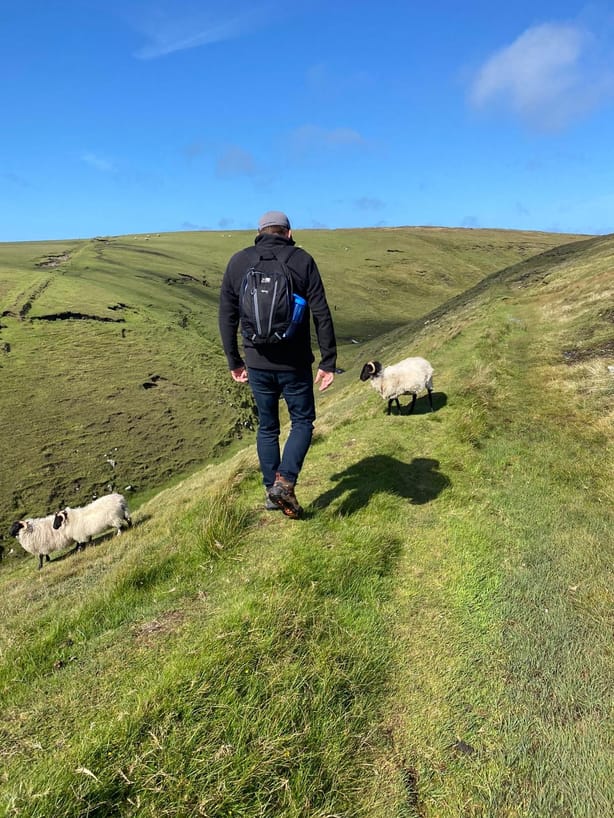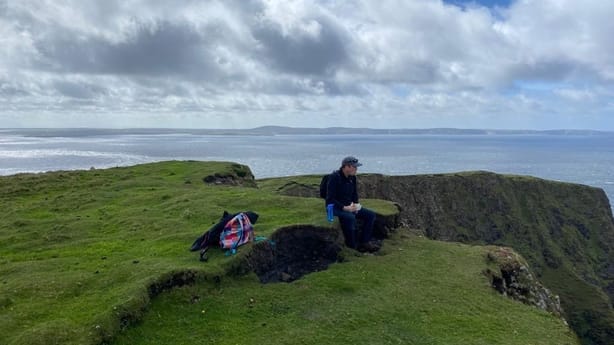Fran McNulty enjoyed our Western shores this summer. Most weekends I can be found rambling across a hill or a bog in the west, sunshine, a heathery breeze, the west feeds the soul, says RTÉ's Agriculture and Consumer Affairs Correspondent.
The lines between home and work have never been more blurred. RTÉ Correspondents have always taken their work home. The mobile phone means people are in contact with you virtually 24/7. If you are a Correspondent working in a certain region or speciality, you need to be on top of your brief. Calls must be answered, houses called to, tea taken, no matter the time nor day.
Thankfully as Agriculture and Consumer Affairs Correspondent my job takes me to every corner of the country, it's quite a perk. There is hardly a county I haven’t reported from in the last year. It provides huge variety and opportunity to meet people and really get a sense of what’s happening all over the country. The car used to be the mobile office, it still is. But on the odd day you could call into the office, work from there, meet friends and colleagues and discuss stories. That is no longer the case.
I left the RTÉ campus in early March, way before most employers took similar action. RTÉ wanted a contingency in place, if Covid was to hit the newsroom, they needed to make sure we had a staff which could keep things going. Isolating some of us meant there would be a 'B' team of sorts. Some colleagues joked those of us asked to work from home were designated survivors, we knew we were spares!

Since then I have been in the office once, to present The News at One.The change was quite sudden. As chance would have it I recently moved to Dublin, such a move means there isn’t quite as much space in my new home to work. The 'Bureau’ as I call it is a small desk, less than a metre wide. From there I have broadcast live and edited TV packages almost every day.
It is a salutary lesson, that you actually need very little space or luxury to work well. Don’t get me wrong, it’s not ideal. The move to home-working came as output and the brief have been busier than ever, and, we have managed.
To deal with the feeling that I am always at work, I’ve introduced a strict rule, work happens at the ‘bureau’. It may be a corner of a room, but it is where work happens. The rest of my home is where I live. After a few weeks, finding microphones on the couch, in the kitchen, laptops lying around in a small place, became tiresome and crowding. You reach a point where you wonder if you are working from home or living at work!
Imposing definition helps create a divide between home and work. Staff across the organisation have helped immensely, on busy days editors work remotely to help edit TV packages, camera operators go to the ends of the earth to make sure you have the pictures, programme editors tailor expectations as working remotely does have some limitations.
People in News and Current Affairs have changed the way they work overnight, without a crib or a moan. The public is still served with journalism, the very same as it always has. It is a testament to a workforce determined to do its job.

Covid has meant much longer working hours, so I have made a determined effort to get outdoors more. Walking is my thing. I am fortunate to be able to spend time in the West of Ireland, during the lockdown it is one of the things I missed most. There was a feeling of being trapped in Dublin. Yes, I could travel for work, but it was for work, and when the job was done, it was back to Dublin.
There were days I was working in the west and the lure and temptation to stay or visit the sea was immense, but, if everyone else was denied the opportunity to get some sand on their feet in their favourite holiday spot, I applied the same conditions. But this August I made up for lost time. The travel restrictions which have kept us grounded have given us all a new appreciation of what’s on our doorstep.
Sligo and Mayo have been the summer stomping ground. I’ve taken to hiking and some of the scenery and gems on offer are outstanding. Most weekends I can be found rambling across a hill or a bog in the west, sunshine, a heathery breeze, the west feeds the soul.
A day spent out on the Inishskeas was one of the best holiday days I think I’ve ever had. The two islands sit between Blackrock Lighthouse and the Mayo Coastline, an unforgiving but beautiful landscape. It was last inhabited in the 1930’s, abandoned shortly after a group of islanders were lost to the sea in a bad storm.

Rambling across the roadless island, where livestock is still kept, the remnants of an old whaling station remain. Empty and abandoned cottages, the sand filling their rooms, blown from the nearby beach are dotted across the islands, some have been maintained.
There are few locations where you can swim in crystal clear Atlantic water, warmed by the summer sun, on a beach which not a solitary soul has stood that day. The west has had my heart for some time now, the Inishskeas have won it.
In many respects I think my new focus on the outdoors is some sort of visceral reaction to being kept indoors for so long. We all miss meals with friends and family, drinks, the theatre. When something like Covid changes the world, we must adapt.
It’s given me a new appreciation for ham sandwiches in the open air. Coffee from a flask in the most silent and remote locations on this island, a longing for the wind on my face, and an appreciation that it is the small things in life, the basics, that make us happy and who we are.

